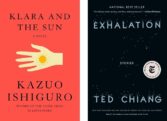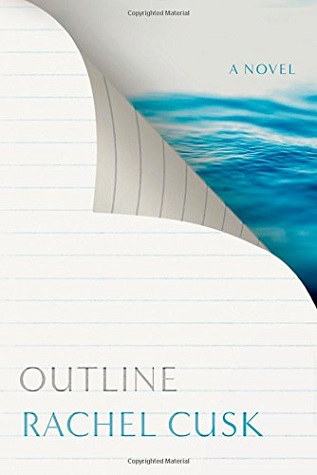
by by Margaret Kolb

Published by Farrar, Straus and Giroux, 2015 | 249 pages
It’s summer time. A recently divorced writer boards a plane to Athens to teach a creative writing workshop. She finds herself seated next to an older and mysterious Greek stranger, also a recent divorcé, and they make plans to meet up on his boat once they land. Untethered from her husband, children, and normal responsibilities for the first time in years, the character of Faye, a middle-aged woman adrift in ennui, is revealed to us gradually as Outline unfolds. We follow Faye as she fumbles through Greece and meets up with old writer friends at bars, sightsees, and teaches one very uncomfortable session of her creative writing course. In the aftermath of the disastrous class, Faye arranges to meet up again with the Greek stranger she met on her flight. This encounter, too, becomes uncomfortable as the stranger announces his desire to move things in a more intimate direction. Her awkward indifference to him, made manifest by her nervous stiffening as he embraces her for the first time, reveals a woman who is simultaneously weary of scripted romance, and yet is unsure of what other alternatives exist.
While Outline’s premise is idiosyncratic enough to be engaging, itis Cusk’s formal experimentation that is the motive force here. Outline, originally published in serial form by The Paris Review alongside phantasmagoric watercolor illustrations by Samantha Hahn, is a novel composed of ten conversations. (Hahn’s illustrations are notably absent from FSG’s edition of the novel, but can be found online.) For the majority of the novel, Faye, like the reader, is on the receiving end of the conversations. While these conversationists are described in voluptuous detail—we hear of the feminist writer Angeliki’s “extraordinarily anxious” face that mars the otherwise elegant figure she cuts, and the stunningly beautiful editor Elena, who “seemed to be composed entirely of curves and waves”—physical descriptions of Faye remain scant. It is largely through Faye’s sporadic and brief interjections and emotional responses that her personality, beliefs, and values – in other words, her “outline” – appears. The fact that Faye’s name is spoken only once in the novel, near the end, is emblematic of Cusk’s deliberately paced approach to her realization within the novel.
As a writer, Cusk can be likened to the fabled sculptor – modeled, perhaps, on Michelangelo – who believes that in sculpting, one simply removes all extraneous portions from the marble block to reveal the figure already latent within it. To be clear, Outline most certainly does not project any confidence in its ability to reveal any grand truth. But the desire to move towards a simultaneously unknowable yet more honest fiction is palpable. Cusk, through her more structural removal of the typical trappings of novel writing, such as plot, characterization, and description, resembles the sculptor in process rather than in vision , Outline ultimately reveals Faye’s existence in this world through a presentation of only the bare essentials of her person..
In recent interviews, Cusk describes herself as a writer who has grown weary of the endeavor of fiction making. In an interview with The Guardian, she stated, "I'm certain autobiography is increasingly the only form in all the arts. Description, character – these are dead or dying in reality as well as in art." Outline hews very closely to this line of thinking. Outline is, in substance, a fictional account, but one that seems to be striving, from within fiction, for something akin to factual autobiography.
Throughout Outline Cusk explicitly engages with questions as to the landscape, the economics if you will, of the writer’s world. In the novel’s first sentence, we learn that prior to boarding the plane, Faye has met with a billionaire who wants to start his own literary magazine. She immediately suspects that he wants to become a writer himself. “A lot of people want to be writers,” the narrator notes, “there was no reason to think you couldn’t buy your way into it.” As her trip to Greece has been funded by her students’ tuition dollars – a fact that she must face when a dissatisfied student demands a refund – Faye is herself complicit in the monetization of the writerly profession (Cusk, it should be noted, is also a professor of creative writing). The narrative of Outline is subsequently haunted by worries as to the ultimate purpose of writing. Does one write to create a lifeline for others, as the feminist Angeliki claims her novel of domestic despair has done for other unhappily married women? Does one publish so that one can earn a living, like Ryan, the Irish writer whose moderately successful collection of short stories earned him a secure, but life-sucking teaching position at the university in his hometown?
Cusk does not present any easy answers to these questions. What she does do is use Faye as a powerful vehicle to communicate debates within the community as to what fiction should, and should not, be. As Faye states, “I was no longer interested in literature as a form of snobbery or even of self-definition—I had no desire to prove that one book was better than another: in fact, if I read something I admired I found myself increasingly disinclined to mention it at all. What I knew personally to be true had come to seem unrelated to the process of persuading others. I did not, any longer, want to persuade anyone of anything.” In these few sentences, Faye articulates a central concern of Outline, and perhaps of Cusk as well: the writer must free herself from the obligation of portraying and persuading, and the reader from the obligation of seeking or expecting to be persuaded. Cusk’s ambling novel ends fittingly with Faye preparing for departure and handing over the keys to her apartment to another writer.
Jeanette Tran is a scholar of early modern literature who also enjoys reading contemporary American fiction. She currently resides in Iowa.















click to see who
MAKE Magazine Publisher MAKE Literary Productions Managing Editor Chamandeep Bains Assistant Managing Editor and Web Editor Kenneth Guay Fiction Editor Kamilah Foreman Nonfiction Editor Jessica Anne Poetry Editor Joel Craig Intercambio Poetry Editor Daniel Borzutzky Intercambio Prose Editor Brenda Lozano Latin American Art Portfolio Editor Alejandro Almanza Pereda Reviews Editor Mark Molloy Portfolio Art Editor Sarah Kramer Creative Director Joshua Hauth, Hauthwares Webmaster Johnathan Crawford Proofreader/Copy Editor Sarah Kramer Associate Fiction Editors LC Fiore, Jim Kourlas, Kerstin Schaars Contributing Editors Kyle Beachy, Steffi Drewes, Katie Geha, Kathleen Rooney Social Media Coordinator Jennifer De Poorter
MAKE Literary Productions, NFP Co-directors, Sarah Dodson and Joel Craig